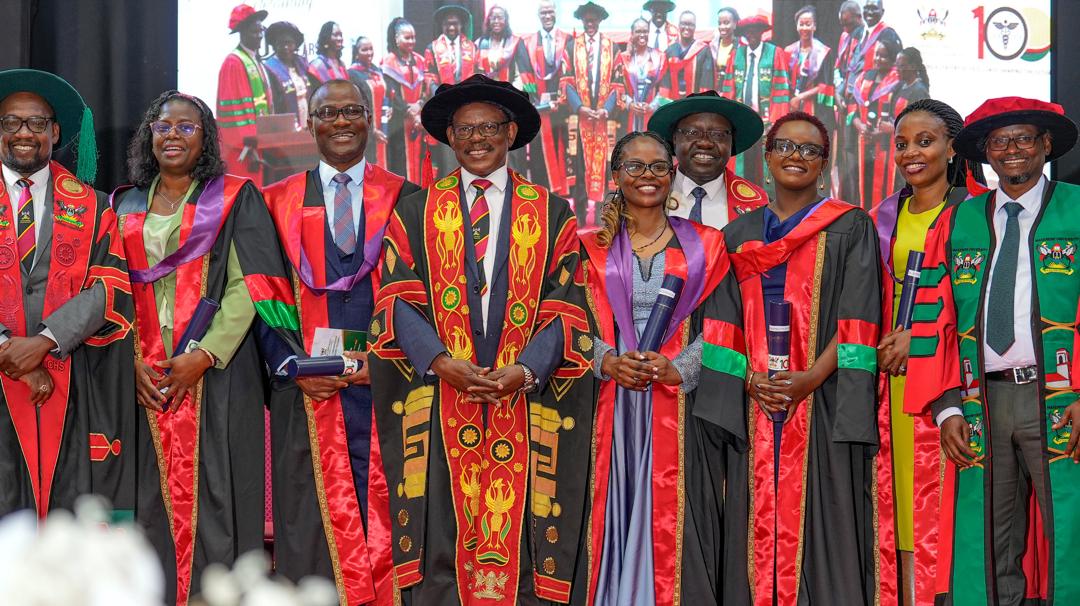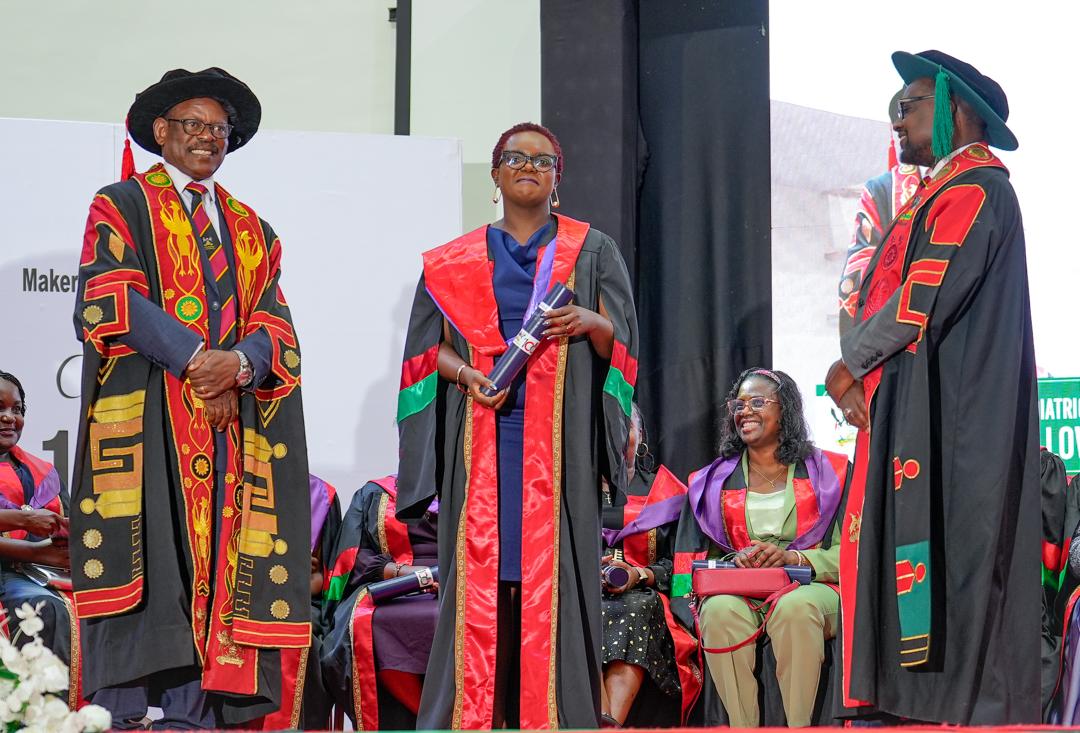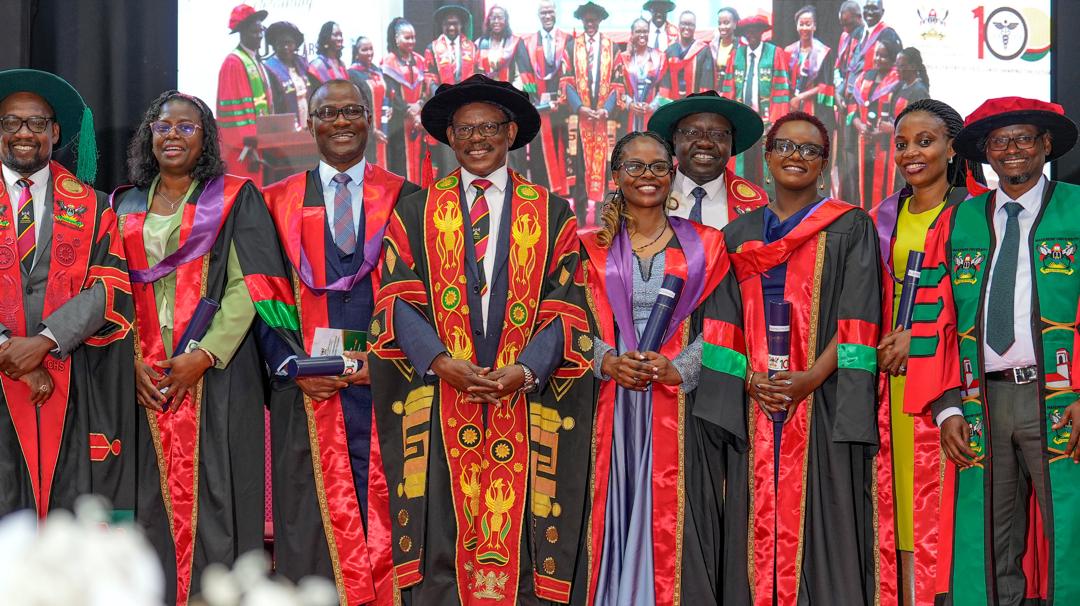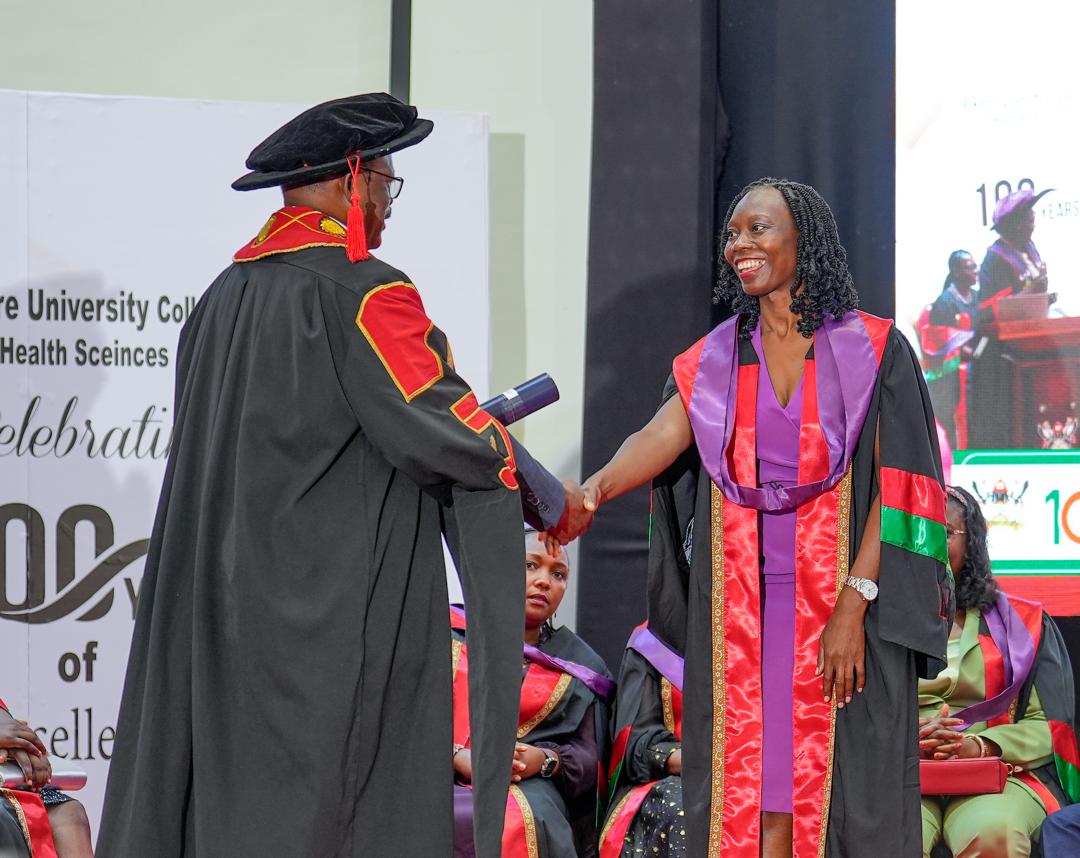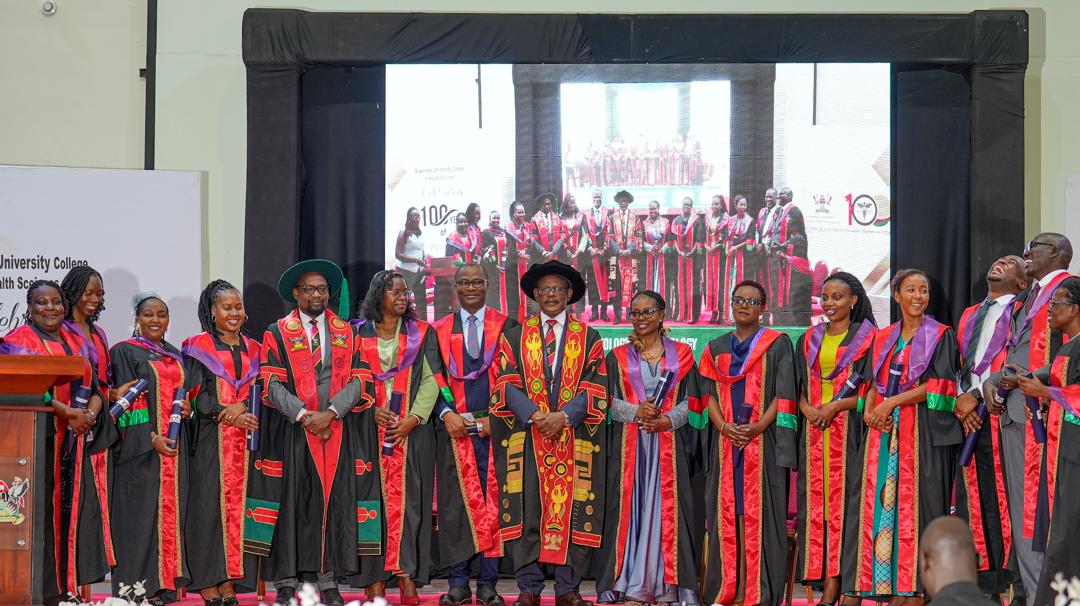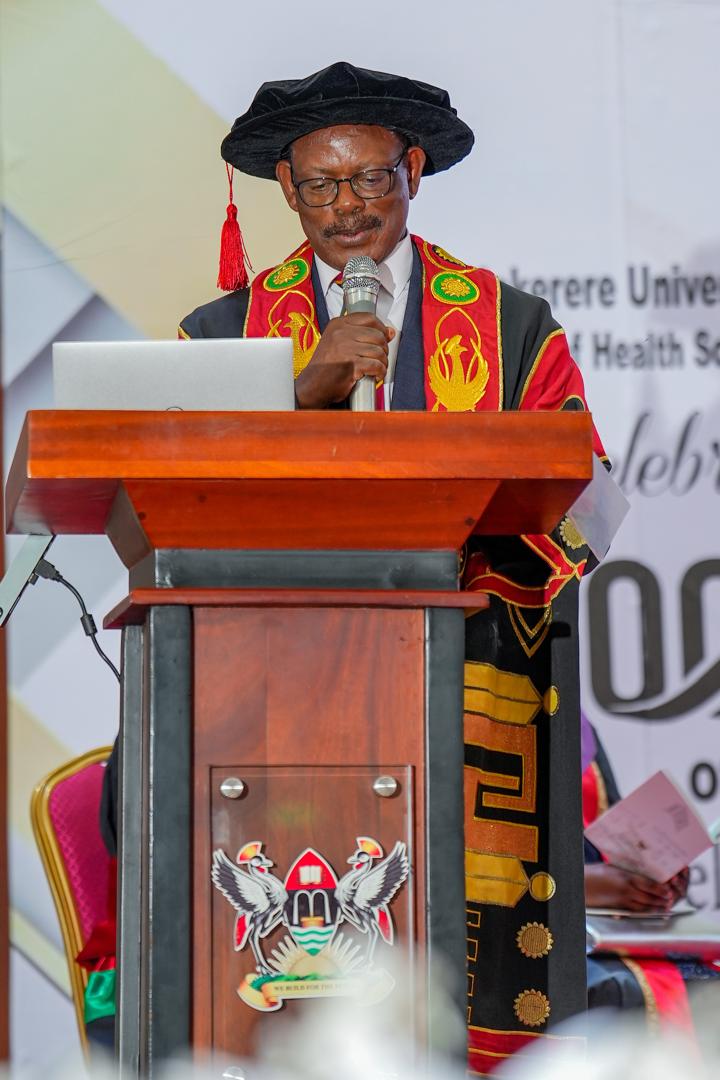On 30th July 2025, Makerere University hit a milestone in specialized healthcare training as it proudly graduated 16 fellows from their Paediatric Hematology and Oncology (PHO) Fellowship Programme. These dedicated physicians who successfully completed a two-year rigorous fellowship program will serve as elite experts in treating life-threatening blood disorders and cancers in children.
The pioneering fellowship program of Makerere University College of Health Sciences (MakCHS) commenced in 2016. This cohort included fellows from Uganda, Kenya, South Sudan, Tanzania, Malawi, Nigeria, and Congo which enhances Africa’s capacity to deliver highly specialized care, promising improved survival rates and quality of life for countless young patients.
In his address to the congregation, Professor Barnabas Nawangwe, Vice Chancellor - Makerere University emphasized the university's guiding vision of research-led, noting that the institution remains committed to producing highly skilled professionals who address Uganda's and Africa's evolving health challenges while acknowledging the resilient hard work of fellows during training and the vital sacrifice as well as support from family and friends.
Prof. Nawangwe recounted Makerere’ significant historical contributions to public health and medical research recalling the College of Health Sciences' past achievements, including it’s 1964 recognition for lymphoma research leading to nomination for a Nobel Prize for the discovery of the cells that cause the cancer of the lymphoma. He cited the university's instrumental efforts and contribution in combatting disease on the continent like the Ebola, Marburg, Nodding Disease and the recent COVID-19 pandemic.
He outlined Uganda's demographic realities and the resultant increase in health challenges with exponential growth of a young population alongside the alarming statistics of childhood cancer and sickle cell disease. With an estimated "7,000 children and adolescents cancer with less than 50% access in treatment," and over "20,000 babies are born with sickle cell every year," the need for specialized care is critical, he said. Professor Nawangwe also stressed the urgency of the situation, "It is reported that many of the deaths from cancer and blood disorders are preventable," stating, "We must produce enough doctors to manage the disease burden we have."
Prof. Nawangwe recognized the instrumental role of partners such as Texas Children's Global and Baylor College of Medicine, among others, who supported MakCHS in setting up the PHO fellowship that began in 2016. He underlined the success of the program, which has since trained 24 paediatricians serving as healthcare leaders across Africa.
In his remarks, Professor Bruce Kirenga, Principal - MakCHS highlighted the institution's century of medical training excellence and its forward-looking vision as the College holds its third graduation ceremony of the PHO Fellowship Program. He emphasized MakCHS’ commitment to advancing healthcare in the region, adding that this future is geared towards more scientific research, innovation and cutting-edge medical care.
Professor Kirenga proudly announced that the fellowship program is the first of their sub-specialized training programs. He revealed the expansion of these crucial programs, noting that the college currently offers three additional sub-specialized training pathways: Neonatology, Interventional Radiology, and Fetal and Maternal Medicine, with two more programs under review; in this regard, Professor Kirenga extended gratitude to partners and collaborators, affirming the college's unwavering dedication to its mission.
Representing the Director General Health of Services and Permanent Secretary of the Ministry of Health, Dr. Richard Mugahi - Commissioner for Child and New-born Health highlighted the vital role of the new specialists in transforming Uganda’s healthcare landscape. Dr. Mugahi emphasized the graduation as not only fellows’ dedication, but also an important step forward for Uganda's healthcare system citing the critical need for their expertise.
He detailed the alarming burden of childhood cancer in Uganda, with 1,500 to 3,000 new cases reported annually, yet only 30% access specialized treatment, resulting in tragically low survival rates of 20-30% beyond three years. In response, the Ministry of Health is strengthening its partnership with Makerere University, recognizing that "the role of research, the role of academia is well highlighted and emphasized," and crucial for producing skilled professionals.
Dr. Mugahi announced the government's strategic plans to absorb these new specialists, actively developing human resource structures and mobilizing resources to utilize their skills nationwide. He also revealed ongoing efforts to decentralize cancer care through regional centres, citing the operational facility in Gulu and planned sites in Arua, Mbarara, and Mbale, all of which will strongly need the fellows' expertise to serve our population. He concluded by reiterating the core mission: "Our mission is clear. We now have the inputs, you're one of the inputs of providing Uganda with the best possible quality of care." He stated.
Encouragingly, Dr. Rosemary Byanyima Mulago National Referral Hospital (MNRH) revealed that the Hospital is charting a new course towards offering highly specialized medical services, emphasizing that they can only offer that when they have people who have trained as super-specialists.
“This strategic move is predicated to building a robust local human resource, specifically super-specialists, whose rigorous training pathway extends beyond a first degree and master's to include a specialized fellowship. The traditional approach of training abroad is very expensive” Dr. Byanyima noted. To overcome this, Mulago is actively working with collaborators to build the capacity to train locally. This innovative model involves sponsoring a select few for training abroad, who then return to establish and lead local programs, significantly enhancing the hospital's self-sufficiency.
“Mulago is uniquely positioned as an ideal training ground due to its infrastructure. We have the equipment. And of course, there are many patients who require the service.” Dr. Byanyima said. She noted that while Mulago provides the environment, it collaborates with accredited training institutions like Makerere University for academic awards.
The benefits of local training are multifaceted; it not only builds internal capacity but also allows the hospital to continuously identify and address service delivery gaps in infrastructure, equipment, medicines, and sundries, Dr. Byanyima added. Local training is also cheaper and eases the very strenuous emotional burden on advanced-age trainees with families, who would otherwise have to relocate abroad for years. Crucially, as these experts train, they simultaneously offer services, with patients directly benefiting from their evolving skills. In addition, she noted, Mulago leverages collaborations to acquire essential resources, while simultaneously lobbying the government for sustained funding to ensure the long-term continuity of the services.
Addressing the escalating challenge of non-communicable diseases (NCDs) like cancer and diabetes, Dr. Byanyima acknowledged the continuously increasing number of patients, necessitating a proportional increase in human resource infrastructure, medicines and surgeries to be able to meet the demand. She also stated Mulago's role in health education at the tertiary level, empowering patients to disseminate crucial health information within their families and communities, complementing primary healthcare prevention efforts by the Ministry.
In his speech, Dr. Joseph Lubega, a Children's Cancer and Blood disease Specialist and Assistant Professor at Baylor College of Medicine, Texas Children's Hospital, USA, recognized the significant advancements in child healthcare across Africa with specialists trained in children's cancer and sickle cell disease.
Dr. Lubega emphasized the profound impact of PHO Fellowship Program on patient outcomes stating that 'whereas when we started this work, most children with cancer anywhere in Africa would die within a month of a diagnosis, now most of them are cured.' Despite this progress, he stressed the imperative to expand reach beyond major cities like Nairobi, Kampala, and Dar es Salaam, aiming for comprehensive coverage across all countries, especially given the much bigger challenge posed by sickle cell disease. The ultimate goal, he explained, is for the specialists to train lower health workers in their countries, ensuring every child is reached.
Challenging the conventional focus on infectious diseases in Africa, Dr. Lubega advocated for greater attention to non-communicable diseases (NCDs), saying, “Sickle cell disease is one of the most common non-communicable diseases. It is part of African DNA, 2% of new-borns get this diseases.” He noted that unlike acute infections, NCDs demand lifelong follow-up and community-based care, necessitating a re-evaluation of health system training.
One of the fellows, Dr. Ankunda Siyadora who works with Mbarara Regional Referral Hospital, noted that the fellowship will revolutionize the landscape of childhood cancer and blood disorder care in Western Uganda. In her words, “my passion was ignited during internship at St. Mary's Hospital in Gulu, Uganda. I witnessed numerous children suffering from advanced Burkitt’s lymphoma, often receiving only palliative comfort. That made me a bit sad, but also built the passion I have for paediatric haematology." she recounted.
Motivated by the stark contrast between 80% survival rates in Western countries and the grim reality she encountered, Dr. Ankunda’s desire is to change the narrative that every child with cancer or blood disorder should die or be in pain. Her fellowship, she believes, will lessen the burden by ensuring every child who has a cancer or a blood disorder, gets an early diagnosis and then get the right treatment for their disease.
Addressing the common misconception that childhood cancers stem from environmental or lifestyle factors, she clarified that "in children, it's more about the genetics, it's just a mistake, something went wrong in the genetics, it's nothing to do with the family or the environment, majority, close to 99% of childhood cancers, are a result of spontaneous mutation." While a small percentage (1-3%) can be inherited, like retinoblastoma, most cases are simply "bad luck, nothing to do with the environment, nothing to do with your parents." This understanding is crucial for families, alleviating guilt and redirecting focus to early intervention.
The experts will be pivotal in improving care for children with blood disorders and cancers, addressing the country's high childhood cancer burden and with the Ministry of Health planning will integrate these specialists into the healthcare system and establish regional cancer centres. This in turn will increase access to specialized care, improve treatment outcomes, and enhance the quality of life for children with cancer and blood disorders in Uganda and beyond.
